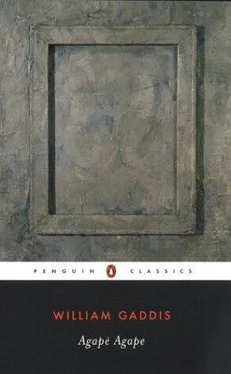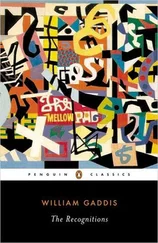But a novel, even a novel that is basically a deathbed screed, cannot just rail indiscriminately at one thing and another. It needs a center, a more directed thrust. This is where the player piano comes in, supplying the framework for the larger, more abstract obsessions. We are alerted to these right away as Gaddis declares his preoccupation and his stance: “. . that’s what my work is about, the collapse of everything, of meaning, of language, of values, of art, disorder and dislocation wherever you look, entropy drowning everything in sight, entertainment and technology and every four year old with a computer, everybody his own artist where the whole thing came from, the binary system and the computer where technology came from in the first place, you see?” If we don’t at first, we do by the time he has concluded his rant.
To begin to approach what Gaddis intended, we might take a moment to parse the novel’s most peculiar title A-GAH-PE A-GAPE. Five syllables, two languages and an oxy-moronic opposition of meanings. The first word — from the Greek — has religious meaning, as Gaddis reminds us; it refers to “that natural merging of created life in this creation in love that transcends it, a celebration of the love that created it.” “Agape,” meanwhile, which has embedded in it the word “gap,” carries the customary meaning of something cleft or opened. A wholeness torn asunder, then, a fall away from origins.
The idea of the gap is relevant here, for Gaddis’ great interest in the player piano — which clearly has literal as well as emblematic application — is focused on the gap-filled piano roll, which, along with Joseph Marie Jacquard’s early nineteenth-century punch-card loom, is seen as a forerunner of the on-off switch simplifications of binary-based systems, and therefore closely linked, at least theoretically, to the eventual emergence of cyberculture.
This is, yes, a great deal to push together, certainly a great deal to lay at the feet — or pedals — of the piano player. But this is how an intelligence like Gaddis’ works — finding examples, interrogating premises, and extrapolating outward until a whole world picture starts to come into focus.
Or attempted focus, in this case, for Gaddis’ narrator is so enraged, so pill distracted (remember the tone of that opening sentence), so chaotically submerged in his notes and papers that we never get a sustained or lucid argument. We grasp that the player piano appeared in the late nineteenth century, putting applied mechanization in the service of popular entertainment; that it brought the finest fruits of popular culture to the paying masses; that it was a way of “having art without the artist because he’s a threat, because the creative artist has to be a threat so he’s swamped by the performer.” The sentences here propagate feverishly, treating the instrument not as a tool so much as a symbolic expression of deeply-rooted cultural tendencies, examining it in the light of ultimates, sub specie aeternitatis, as it were, building assertions and implications until we finally get to a citation from the philosopher Democritus about how “the finest poems were composed with ‘inspiration and a holy breath’. . the holy breath that sets us apart from reason and above reason, some inner revelation, some inner ecstasy even some abnormal mental state why they’re out to eliminate us.”
The declaration brings relief and clarification. Here, at last, Gaddis sets out the terms of the opposition and links art, at least at its foundations, to the almost hermetic traditions of spirit. The passage — and indeed the book — is now revealed to be an exalted, paranoid outcry, a last proclamation of the idea of the sacred rootedness of true art. In this way, Agapē Agape looks back to The Recognitions, to Gaddis’ fascination with authenticity and the originating impulse of creativity.
As must be evident by now, Gaddis is no aesthetic democrat. He is an unapologetic elitist, very likely a subscriber to the long-banished — but in certain quarters (most recently in the work of Harold Bloom) recrudescent — idea of artist as genius innovator. From Democritus and the “holy breath” he bends his thought back to his own situation, reconnecting with his animus: “. . why they’d say I’m afraid of the death of the elite because it means the death of me of course I can’t really blame them, I’ve been wrong about everything in my life it’s all been fraud and fiction. .”
His is a dark brooding, and more than a little wounded: “Fact that I’m forgotten that I’m left on the shelf with the dead white guys in the academic curriculum that my prizes are forgotten because today everybody’s giving prizes for that supine herd out there waiting to be entertained, try to educate them did they buy those ‘Educator’ piano rolls teach them to play with their hands no, went right on discovering their unsuspected talent playing with their feet here’s Flaubert’s yes, ‘The entire dream of democracy’ he says, ‘is to raise the proletariat to the level of bourgeois stupidity.’”
Agapē Agape is not in any sense of the word a happy book. Nor, indeed, is it in any strict sense a novel. A thinly veiled autobiographical rant does not a fiction make. But — and the conjunction here is critical — the book is something more than the sum of its execrations. It is a brimstone tract, but it is also art. The voice holds fast, draws us back and forth over the art/life boundary with relentless insistence, while Gaddis’ artifice of giving his thoughts and howls of outrage to a dying writer imparts the eerie feeling that these are really the author’s own deathbed apprehensions of the darker truths of life. Whether we have read Gaddis’ oeuvre or not, we bring to these pages our sense of his great authority and attainment. These are not just any lamentations. They are Gaddis’ “mene, mene, tekel, upharsin”—we have been weighed in the balance and we have been found wanting — inscribed under obvious duress. The artist’s hard-won insights are driven home with a shudder.
No but you see I’ve got to explain all this because I don’t, we don’t know how much time there is left and I have to work on the, to finish this work of mine while I, why I’ve brought in this whole pile of books notes pages clippings and God knows what, get it all sorted and organized when I get this property divided up and the business and worries that go with it while they keep me here to be cut up and scraped and stapled and cut up again my damn leg look at it, layered with staples like that old suit of Japanese armour in the dining hall feel like I’m being dismantled piece by piece, houses, cottages, stables orchards and all the damn decisions and distractions I’ve got the papers land surveys deeds and all of it right in this heap somewhere, get it cleared up and settled before everything collapses and it’s all swallowed up by lawyers and taxes like everything else because that’s what it’s about, that’s what my work is about, the collapse of everything, of meaning, of language, of values, of art, disorder and dislocation wherever you look, entropy drowning everything in sight, entertainment and technology and every four year old with a computer, everybody his own artist where the whole thing came from, the binary system and the computer where technology came from in the first place, you see? I can’t even go into it, you see that’s what I have to go into before all my work is misunderstood and distorted and, and turned into a cartoon because it is a cartoon, whole stupefied mob out there waiting to be entertained, turning the creative artist into a performer, into a celebrity like Byron, the man in the place of his work when probability came in and threw that whole safe predictable Newtonian world into chaos, into disorder wherever you turn, discontinuity, disparity, difference, discord, contradiction, what they’re calling aporia they took from the Greeks, the academics took the word from the Greeks for this swamp of ambiguity, paradox, perversity, opacity, obscurity, anarchy the clock without the clockmaker and the desperate comedy of Kierkegaard’s insane Knight of Belief and even Pascal’s famous wager in a world where everyone is “so necessarily mad that not to be mad would amount to another form of madness” where the artist is today, the artist the real artist Plato warned us about, the threat to society and the, read Huizinga on Plato and music and the artist as dangerous and art as dangerous and music in this mode and that mode, the Phrygian mode to quiet you down and the tenor and bass Lydian to make you sad and the soft and drinking harmonies, the Lydian and the Ionian where the art the, the artist having trouble breathing here I, coming out of the anaesthesia down in the recovery room tried to raise my leg and it suddenly jumped up by itself like a, like the pain avoiding pain that’s what all this is about isn’t it? Seeking pleasure and avoiding pain, beyond the pleasure principle? My golden Sigi his mother always called him, if Emerson was right and we are what our mothers made us? “Pleasure and pain I maintain to be the first perceptions of children,” the first forms virtue and vice take for them, not my golden Sigi no, he lifted it from Plato’s Laws Book II, talking about his own high ethical standards.
Читать дальше












